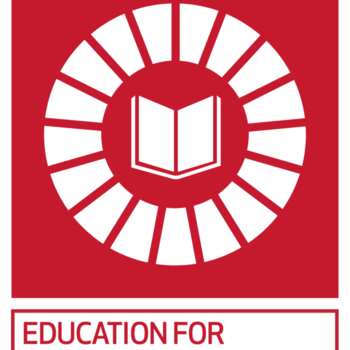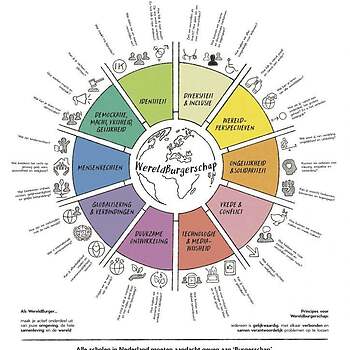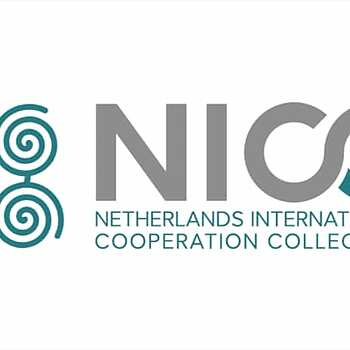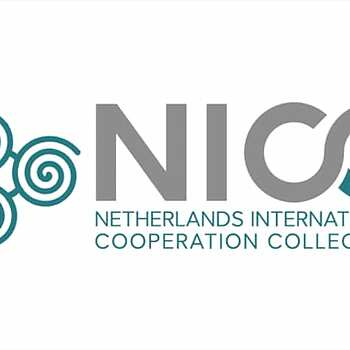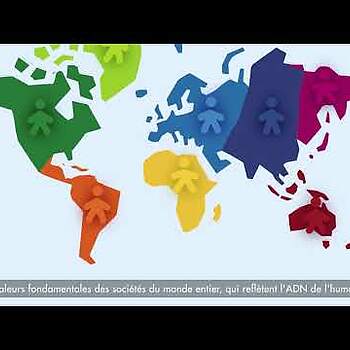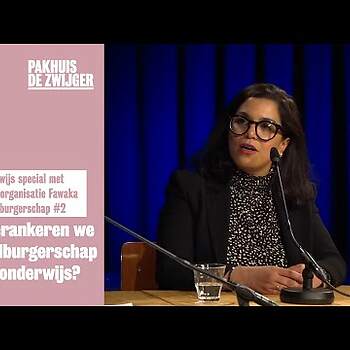- “[…] we must foster global citizenship. Education is about more than literacy and numeracy – it is also about citizenry. Education must fully assume its central role in helping people to forge more just, peaceful and tolerant societies.” - Ban Ki-moon on September 26, 2012, in his remarks at the Launch of the Education First Initiative.
The NCDO’s new mandate
Following a governmental policy note in 2009, called ‘Investing in Global Citizenship’ (‘Investeren in mondiaal burgerschap’) (see the last bullet), the NCDO’s mandate changed in 2011. Where it previously was focused on building support for international cooperation, and later the Millenium Development Goals (MDGs), it changed to become a centre of knowledge and advice regarding citizenship and development cooperation. Read more here (this timeline is still in development).
Sustainable Development Goals (SDGs) and education
In 2015, the SDGs were formally announced (see the next bullet). Among the 17 goals, SDG 4 specifically aims to ensure inclusive and equitable quality education and promote lifelong learning opportunities for all individuals. Within SDG 4, target 4.7 outlines the goal for all learners to acquire knowledge and skills needed to promote sustainable development. This target places emphasis on the following:
“One of these targets, 4.7, refers to the knowledge and skills that are necessary for a sustainable future. Specifically, it states that by 2030, we have to “ensure that all learners acquire the knowledge and skills needed to promote sustainable development, including, among others, through education for sustainable development and sustainable lifestyles, human rights, gender equality, promotion of a culture of peace and non-violence, global citizenship and appreciation of cultural diversity and of culture’s contribution to sustainable development”. Source: UNESCO (emphasis added).
Indicator 4.7.1 specifically focuses on education for sustainable development and global citizenship. Education for sustainable development (ESD) refers to the process of equipping students with the knowledge, skills, and values they need to contribute to a more sustainable world. Indicator 4.7.1 measures the extent to which education systems globally are integrating ESD and global citizenship education into their curricula and teaching practices. It tracks the proportion of students in all levels of education who have been educated on ESD and global citizenship education. More concretely:
“The current global indicator for target 4.7 is: “4.7.1 Extent to which (i) global citizenship education and (ii) education for sustainable development, including gender equality and human rights, are mainstreamed at all levels in: (a) national education policies, (b) curricula, (c) teacher education and (d) student assessment”.” Source: UNESCO.
As a member of the UN and a signatory of the Sustainable Development Agenda, the Netherlands is obliged to comply with its goals and to work towards achieving the goals by 2030.
- "UNESCO (2018) defines GCE as a form of education that ‘aims to empower learners of all ages to assume active roles, both locally and globally, in building more peaceful, tolerant, inclusive and secure societies’." Source: Duarte and Jones (2022).
New law on citizenship and education
In 2006, schools in primary and secondary education became obligated by Dutch law to pay attention to citizenship by actively promoting citizenship and social integration. In hindsight, this law has often been considered as vague as it did not provide schools with clarity on how to achieve these goals. As such, in 2020 Education Minister Arie Slob submitted a proposal to amend the law titled “'Verduidelijking burgerschap' (Clarification of Citizenship): Article 17 - Actief burgerschap en cohesie”. This article addresses active citizenship and social cohesion. The proposed amendment aimed to provide more specific formulations of citizenship and educational goals, reducing the potential for interpretation by schools. Following the submission, the law “Verduidelijking burgerschap”, was subsequently reviewed by parliament. This review process provided an opportunity for the NUFFIC to advocate for the inclusion of global citizenship alongside traditional citizenship in school curricula. The NUFFIC seized this chance to promote the idea of incorporating global citizenship education as an integral part of students' learning experiences.
A year later, the new law for citizenship education in primary and secondary education (‘funderend onderwijs’) was adopted. The law mandates that all schools teach their pupils and students about the basic values of democracy, such as freedom, solidarity, and equality, as well as the rule of law. The PO-Council and VO-Council have expressed their support for Dutch schools in implementing this new law. Additionally, several organisations are assisting schools in incorporating global perspectives into their citizenship education, as is discussed below.
Organisations
In the school year 2019/2020 the Municipality of Amsterdam intensifies the “Amsterdammerschap in het onderwijs” (Amsterdammership in education) approach. As part of this approach, a pilot programme, Fawaka, was implemented, initially focusing on supporting four schools in shaping citizenship education in secondary education, with a specific emphasis on global citizenship. This pilot was part of a strategy that aimed to educate children in Amsterdam in a way that prepares them for a life in a ‘world city’ by teaching them a second language and through the provision of internationally oriented education. It has been found that bilingual education and Global Citizenship Education (GCE) are often interconnected in the Netherlands.
Over time, Fawaka Wereldburgerschap has grown into a bigger organisation, collaborating with schools to incorporate GCE into their curricula. Globi and Alliantie Wereldburgerschap undertake similar work as platforms for primary and secondary educational institutions. Following the new law on citizenship, they provide learning platforms for schools to become versed in global citizenship education. SamSam, formerly part of the NCDO, do similar work focused on primary education.
Tertiary educational institutions are also expanding their inclusion of global citizenship into education. In 2019, The Hague University of Applied Sciences started with a Global Citizens research group, specifically focused on vocational education. Similar initiatives have been started at the HvA, UvA, and others.
NUFFIC, as an organisation dedicated to promoting internationalisation of education, has incorporated the SGDs, particularly SDG 4 on education, into its operations. In 2022, NUFFIC celebrated its 70th anniversary. Its jubilee year had the theme “Meet the world, make the change”, once more highlighting the global aspect of its mission. To read more about the history of NUFFIC, click here.
Sources and further reading:
- UNESCO, SDG indicator 4.7.1: Proposal for a Measurement Strategy, 2015.
- Fawaka Wereldburgerschap. (2021). NIEUWE WET BURGERSCHAPSONDERWIJS PER 1 AUGUSTUS 2021 - BEWEGING RICHTING WERELDBURGERSCHAP.
- SLO. (2022). wet- en regelgeving.
- NUFFIC. (2020). De wereld begint op school: van burgerschap naar wereldburgerschap.
- de Rekenkamer Amsterdam. (2021). Uitvoering ambities Coalitieakkoord 2018-2022.
